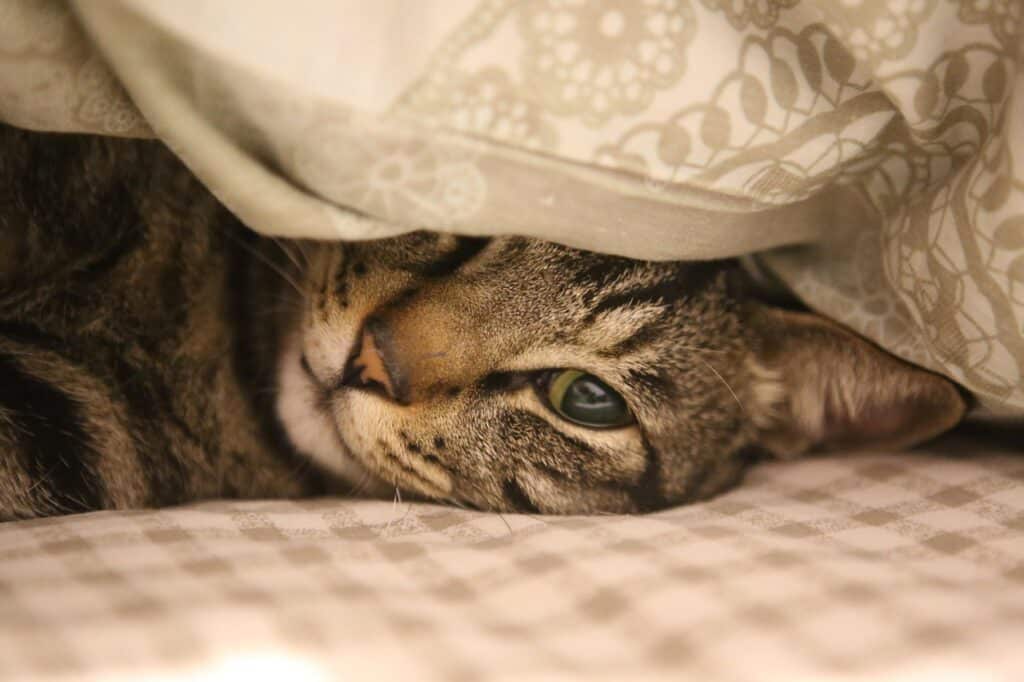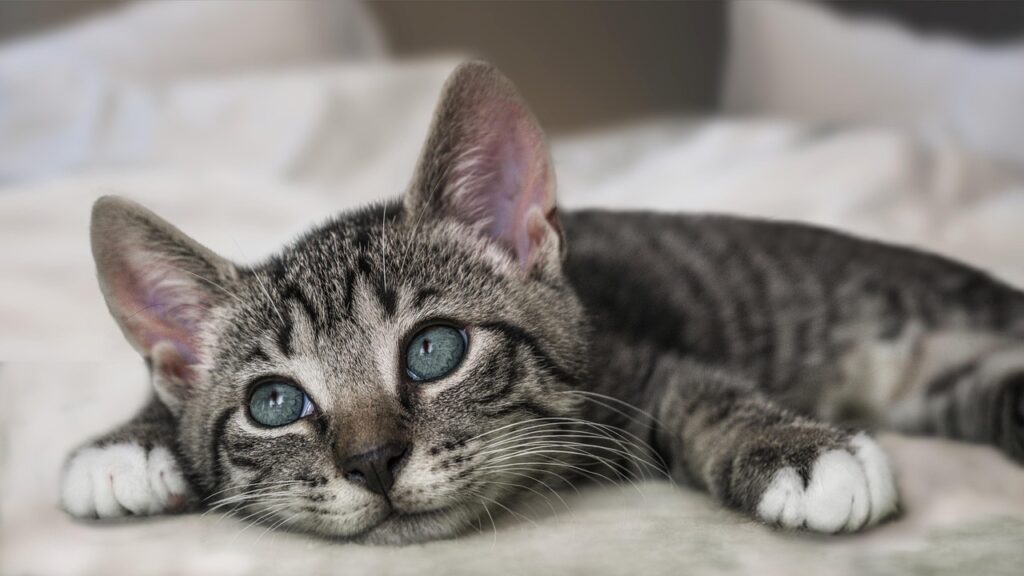It’s fascinating to explore how anecdotes, half truths, and even downright fabrications can slowly weave their way into the public consciousness. A constantly evolving game of telephone where stories ebb and flow over the years, slowly growing limbs of exaggeration, turning from speculation and sensation into what are thought to be mundane facts. If you look up the topic of ‘zombie facts’ you’ll see plenty of examples.
From those very case files comes a phenomenon that I stumbled across while researching a previous article: in his most recent comedy special ‘Quiet Ones‘, comedian Pierre Novellie talks about cats in nursing homes sleeping on patients’ beds as a sign of predicting their deaths, as if it’s common knowledge (while hilariously comparing it to an unexpected sighting of Louis Theroux). It seemed vaguely familiar to me when I heard it, but something didn’t sit quite right. Further investigation was required.
Purr-ported truth
Do we really have an informal workforce of feline long-in-the-tooth-sayers prowling our communal geriatric residences to help get a head-start on notifying loved ones about an imminent departure? Sadly not, but the myth wasn’t fabricated from nothing.
There’s plenty of folklore about crows, ravens, black dogs, and other (presumably darkly coloured) animals being harbingers of death, but much more recent history has conjured up a couple of considerably cuddlier clairvoyant creatures. Both Buckwheat and Oscar were cats that lived in care homes. Both became known for going to the rooms of patients who were soon to die. Both became minor media celebrities as local and international news outlets caught wind of a sort-of ‘feelgood’ story, despite the fact that the payoff was death.
Both even allegedly came to be used as an ‘early warning system’ by staff, who would be able to contact patients’ families in time for them to come over and say their last goodbyes.
Mews-flash
In terms of celebrity, Oscar proved to be the more alluring to the media. He even inspired an episode of House. The capturing of the public’s imagination was almost certainly due to the bolstering testimony and writings of geriatrician Dr David Dosa, who wrote an entire book centred around it, although it had much broader content about end-of-life care for people with dementia.
More importantly, though, his writings made it into one of the world’s most prestigious journals, The New England Journal of Medicine (NEJM), with all the implied scientific rigour that such a publication implies. As a result, Dr Dosa made many media appearances where he successfully advocated for his belief in Oscar’s infallibility.
Due to this intoxicating concoction of celebrity and credibility, we will focus our attention purely on Oscar for the rest of this article. Sorry, Buckwheat.

Paws for thought
There’s a saying in skeptical circles: “Before explaining why something happened, make sure it actually happened”. None of the media outlets that have reported on these stories have bothered with this, of course, so it’s up to us pesky skeptics to do it for them.
Before we look at the reality of the situation though, let’s stop and think about what type of information we’d actually hope to have in order to definitively prove these claims: to start off, a detailed layout of the care home would be vital. We’d need to know exactly what areas the cat would have unfettered access to, which doors are routinely propped open, and which ones are on self-closing springs. Orientation of the building would be useful, along with weather data – particularly, dates when the sun was shining. In an ideal world there would be information about temperature in each room, but that’s unlikely to be available. Occupancy details of the rooms would of course be necessary.
Much more important than all of the above though: we’d need to have a tracker on the forecasting feline, and, sorry to be grizzly, but sadly we would need precise details of who passed away and when. For bonus points, if there was information about patients who had to be taken out of the care home to a hospital and subsequently died there, it would certainly be useful.
With all of this data at our disposal, some statistical wizardry would allow us to determine if the cat did indeed reliably spend more its time in the rooms of the nearly departed than would normally be expected. It would of course need to be distinguishable from regular patterns of behaviour, as it’s unlikely that keeping the company of imminent corpses would be a full-time job.
Fur-tune teller
So, do we have anything close to the above in order to make a decision on whether Oscar’s abilities were genuine? Sadly, no. All we really have is testimony and anecdotes from staff members. And here’s the problem: these are well-qualified, thoughtful, hard-working, compassionate people doing their best to make the last stages of life as comfortable as possible for their patients. It seems somewhat disrespectful to imply that their assertions are without merit. Unfortunately though, there’s a sizeable probability that what we could be seeing here is a strangely infectious case of confirmation bias, perhaps with traces of the frequency illusion helping the spread.
To illustrate: perhaps one or two staff members happened to notice Oscar in the vicinity when a patient passed away and remarked on it. Perhaps they mentioned it to other staff members. Now we have multiple people primed to look for Oscar any time they’re around a patient that appears to be struggling. Positive sightings will be spoken of at great length, and negative sightings will be ignored or excused.
Downton Tabby
We can also safely state that Oscar spent plenty of time in the rooms of people who weren’t about to die, and it’s fair to assume that at least one person (and probably many more) passed away in the home without Oscar by their side. That alone should be enough to dismiss these claims without any better evidence.
But what about that paper in the NEJM? Surely that can’t be brushed aside quite so easily? Well, it turns out it wasn’t a paper. There was no study. No data. No methodology. No analysis. Certainly no peer review. It was just an essay.
Why would such a prestigious journal publish something like that? Well, presumably it was deemed relevant to the subject of geriatric care, and the speculation about mechanisms which might be at work if cats could indeed sense impending death would be of some interest. Unfortunately, it appears to have added a perception of credibility on to an entirely unproven phenomenon. It has also encouraged me to send my ‘What I did during my summer holidays’ essay to Nature – fingers crossed!

Get-out claws
The deeply unsatisfying answer to whether or not Oscar could successfully predict deaths or not is “We don’t know”. Personally, I’d downgrade that even further to “Probably not”. Whether or not you agree with my more pessimistic verdict, I think it’s safe to say that it would be both unwise and premature for anyone to consider the evidence and think that the answer is “Yes”.
Let’s remember as well that medical professionals are already pretty good at identifying when people are reaching their final moments. Anyone who’s experienced a reasonable amount of grieving will probably be familiar with receiving the ‘get here quickly’ call. It’s bordering on insulting to those professionals to suggest that we might need to leverage assistance from elsewhere in the animal kingdom.
The whole kitten caboodle
Just for fun though, let’s take a leap of faith and give Oscar a pass, as many have already done, and believe that he really has those capabilities. Once that’s granted, we can speculate on what mechanism(s) might be at play. Of course, there’re some suggestions of the paranormal, with the ‘Official Witch’ of Salem apparently believing that Oscar was a ‘familiar’ (a supernatural spirit, often in animal form, that is believed to serve and protect a witch). No word from any of the off-brand unofficial witches.
More mundane though was the common belief that Oscar’s keen sense of smell was simply picking up the scent of biochemicals released by dying cells, which is certainly plausible, but there’s no attempt to explain why that might have caused Oscar to be more inclined to sit with those patients.
I’ve got a funny feline about this
What everyone seems to have entirely missed in all of this is baffling. What about bog-standard cat behaviour? They sleep for 12-16 hours a day. They prefer warm, quiet, comfortable areas to do so. If there is someone who is in particularly poor health, then the temperature in their room may be set higher than average, as they’re more likely to feel cold. Someone close to death in many circumstances is much less likely to move around, so their bed could be seen as a warm and comfortable place to lie with less chance of being disturbed.
There were some testimonies of Oscar sitting on the windowsill of the patients instead of on their bed – this is pretty common for cats on sunny days, and particularly tempting in a quiet, already warm room. It’s also likely that someone who is in particularly bad health is more likely to be visited by care home staff, so their door will be opened more, or even propped open so that staff can cast an eye on that patient informally as they pass by, providing easy access to those without opposable thumbs.
Furthermore, any food left for patients to eat is more likely to be left untouched – which represents a much more tempting scent for opportunistic moggies than dying cells in a body. There are so many reasons why a cat might show a preference for a particular room at any given time and, bizarrely, none of this has been considered.
Scratching post-mortem
In conclusion, we’ve got no idea if Oscar, Buckwheat, or any other animals can reliably predict deaths, but we do have a lot of people who are so desperate to believe it that they’ll accept it without due consideration. There might be something there, but there are numerous confounding factors.
Even if something were ever proven, it’s unlikely to be of any real practical use. On the flip side, we’ve got talented humans who are already doing an amazing job in difficult circumstances, and we’ve got our feline friends bringing much-needed comfort to people in the later stages of their lives.
Cats are already awesome. We don’t need them to be magic.



